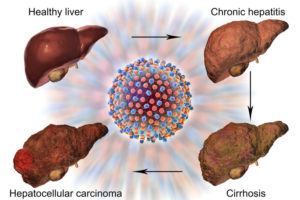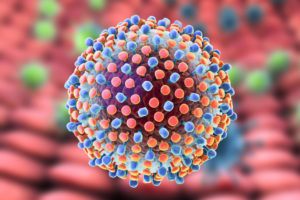Hepatitis C is a “highly burdensome public health problem in Canada, which actually causes more years of life lost than any other infectious disease in the country” – it was said the other day by the liver specialists from the Canadian Association for the Study of the Liver.
It is now recommended by these specialists that a blood test is urged for all Canadians born between 1945 and 1975 to screen for the virus, because it was estimated that 2/3 of the population in this age group would be potential infected.
The disease is slow moving and often doesn’t present symptoms until serious liver damage or disease has already occurred. You can carry this infection for decades in your liver and actually have no symptoms at all, feeling perfectly well. Then it starts to show up with weird symptoms.
Between 45 per cent and 70 per cent of Canadians infected with HCV are unaware they have the disease, which can lead to liver disease and potential death.

A few words about this virus.
Hepatitis simply means “Inflammation of the liver”; it combines “hepato” = Greek for liver and –“itis” meaning inflammation.
Because of its genetic structure HCV is considered a member of the family Flaviviridae (Flavi, in short), which include tick-borne encephalitis, dengue virus, yellow fever virus, West Nile virus etc. Six major types of strains and some 60 subtypes have been located. Of these, the most aggressive seems to be type I, subtype b (type 1b). It is the most common type in the United States, Canada, Japan and Europe. Although it is possible to test a person for a particular type of HCV, testing is rarely done because of the cost. Symptoms are all the same for all the types and subtypes.
Hepatitis C virus is one of the smallest virus known to humankind. In comparison, smallpox virus is one of the largest, it can even be seen even though a microscope! If you take 3 million smallpox viruses and laid them down like bricks they would just about cover the period at the end of this sentence. HCV is so small that comparing it with smallpox it will look like a blueberry on top of all these bricks! Measuring it is a problem in itself, it is estimated that the size of it to be about 30-35 nanometeres. This incredible small size has made HCV very hard to study.

The infection spreads when blood contaminated with the virus enters the bloodstream of an uninfected person. It is the only way of contamination.
Signs and symptoms of a person diagnosed with HCV are:
- Bleeding easily
- Bruising easily
- Fatigue
- Poor appetite
- Yellow discoloration of the skin and eyes (jaundice)
- Dark-colored urine
- Itchy skin
- Fluid buildup in your abdomen (ascites)
- Swelling in your legs
- Weight loss
- Confusion, drowsiness and slurred speech (hepatic encephalopathy)
- Spider-like blood vessels on your skin (spider angiomas)
Fatigue from a liver-based disease is different than other types of fatigue. It produces a terrible sense of lifelessness and a loss of will. Exhaustion can become monumental and getting out of the bed to start the day requires tremendous effort.
Every chronic hepatitis C infection starts with an acute phase. Acute hepatitis C usually goes undiagnosed because it rarely causes symptoms. When signs and symptoms are present, they may include jaundice, along with fatigue, nausea, fever and muscle aches. Acute symptoms appear one to three months after exposure to the virus and last two weeks to three months.
Acute hepatitis C infection doesn’t always become chronic. Some people clear HCV from their bodies after the acute phase, an outcome known as spontaneous viral clearance. In studies of people diagnosed with acute HCV, rates of spontaneous viral clearance have varied from 14 to 50 percent.
The average incubation period is 15-25 years, even though there were patients having hepatitis after as long as 50 years.
Acute hepatitis C also responds well to antiviral therapy. It is no longer a deadly disease. Conventional medicine focuses on the use of Interferon (an immune stimulant) and Ribavirin (antiviral drug). The treatment is expensive, has (sometimes) severe side effects (especially interferon) and is only partly effective. The most common side effects of interferon (for about 80% of the patients) is similar to a moderate case of the flu – imagine having the flu for a whole year of the treatment! The major side effects of ribavirin is hemolysis (destruction of the red blood cells – which will lead to a prolonged fatigue).
Both Interferon and Ribavirin are designed only to deal with the presence of the virus; they do nothing to heal damage to the liver and other systematic effects of the disease.
Here, botanical medicine will help. Scores of herbs have been found to be specifically active against hepatitis viruses. Top 10 botanicals would be: Boldo, Baical skullcap, Bupleureum, Burdock, Dandelion, Milk thistle, Phyllanthus, Picorhiza, Reishi mushroom and Turmeric. In general, three types of liver herbs should be used for treating hepatitis C:
- Herbs that reverse or prevent damage to liver cells
- Herbs that possess antiviral action against hepatitis viruses
- Herbs that reverse hepatitis symptoms and optimize liver functioning.

In terms of nutritional supplements: many supplements have been found to be extremely helpful in treating viral hepatitis. These supplements stimulate and support the immune system, enhance energy levels, increase faster healing time, support liver health and reverse liver damage. The following nutraceuticals would find a place on my treatment list: ALA, NAC, Selenium, vit.C and Zinc.

One of the most important things to do for treating hepatitis is reducing the work your liver has to do. One of the ways to do this is to eat foods that are easier for your liver to process and to choose foods that are known to stimulate liver and the immune system.
